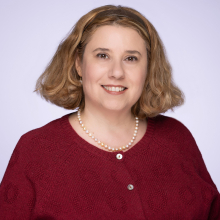Dr. Annie Savard

- Mathematics Education
- Ethnomathematics
- Critical Thinking and Decision-Making
- Financial Literacy Education
- Inquiry Based-Learning
- Robotics
- Learning and Teaching Probability
- Professional Development for Teachers
- Epistemological Stances
- Collaborative Research
- Professional Learning Communities
Professor Savard's research focuses on the contribution of mathematics in elementary school to the development of citizenship competencies, such as decision-making and critical thinking about gambling, from an ethnomathematical perspective. Dr. Savard's research attempts to define the conceptual field of probability for learning and teaching in the mathematical context. Her work also looks at the use of robotics to develop scientific and mathematical competencies within a context of interdisciplinarity, and at the professional development of teachers through Professional Learning Communities. In addition, Professor Savard's research focuses on how financial education, decision-making and critical thinking in K-12 contribute to developing citizenship.
- 2008, Ph.D. Didactique des mathématiques, Faculty of Education, Université Laval, Québec City, Canada. "Le développement d’une pensée critique envers les jeux de hasard et d’argent par l’enseignement des probabilités à l’école primaire: Vers une prise de décision."
- 2004, M.A. Didactique des sciences, Faculty of Education, Université Laval, Québec City, Canada. "Les conceptions des parents concernant les sciences à l’école primaire."
- 1992, B.A. Baccalauréat en enseignement primaire et préscolaire, Faculty of Education, Université Laval, Québec City, Canada.
- Savard, A. & Cyr. S. (2018) A Waterfall Model for providing Professional Development for teachers: A Pilot project to implement a competency-based approachGlobal Education Review, 5(3), 165-182.
- Jao, L. Wiseman, D., Kobiela, M., Gonsalves, A. & Savard, A. (2018).Practice-based pedagogy in mathematics and science teaching methods: Challenges and adaptations in context.Canadian Journal of Science, Mathematics and Technology Education, 18(2), 177-186.
- Polotskaia, E. & Savard, A. (2018). Reasoning development in solving additive word problems: The relational paradigm. Research in Mathematics Education.
- Kobiela, M., Jackson, K., Shahan, E. & Savard, A. (2018). Sorting to develop definitional reasoning. Teaching Children Mathematics, 24(4), 250-257.
- Polotskaia, E., Savard, A. & Freiman, V. (2017). Des éléments indispensables dans le développement du raisonnement algébrique au début de l’apprentissage des mathématiques. Nouveaux c@hiers de la recherche en éducation,20(3), 79-105.
- Savard, A. (2017). Implementing Inquiry-Based Learning Situation in Science and Technology: What Are Elementary School Teachers’ Learning Intentions about Mathematics? Philosophy of Mathematics Education Journal, (32) Special Issue: Mathematics Education and the Environment.
- Freiman, V., Polotskaia, E. & Savard, A. (2017). Introducing algebraic way of solving word problems in early grades using computer-based environment and classroom discussion. ZDM Mathematics Education, 49(6), 835-849.
- Savard, A. & Polotskaia, E. (2017). Who's wrong? Tasks fostering understanding of mathematical relationships in word problems in elementary students. ZDM Mathematics Education, 49(6), 823-833.
- Savard, A. & Manuel, D. (2016). Teaching Statistics in Middle School Mathematics Classrooms: Creating an Intersection for intra and interdisciplinarity. Statistics Education Research Journal, 15(2), 239-256.
- Cyr, S., Savard, A. & Braham, E. (2016). Analyse d’un Projet Pilote d’Intégration d’une Approche par les Situations dans l’Éducation de Base de la République Démocratique du Congo. Comparative and International Education / Éducation Comparée et Internationale. 45(3), Article 4. http://ir.lib.uwo.ca/cie-eci/vol45/iss3/4
